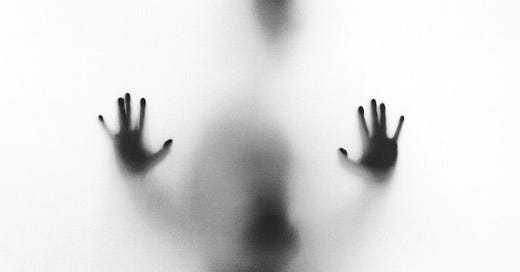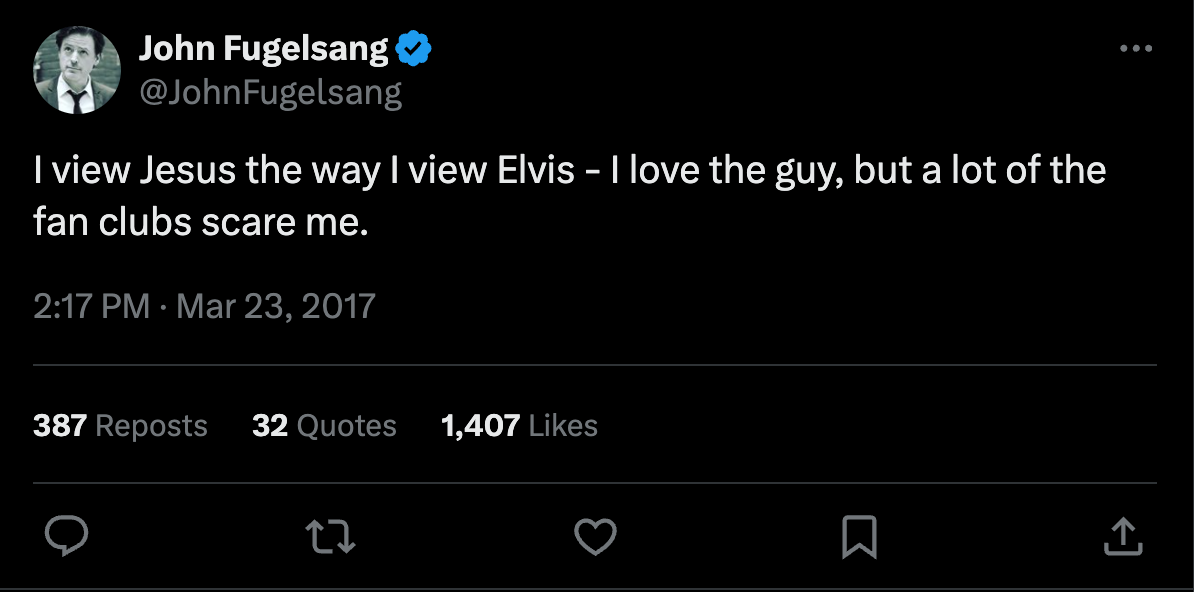Facing Our Shadows: How Self-Awareness Can Help Heal a Polarized World
Owning our inner darkness can help brighten our collective future.
ETA: I wrote this before the US election and before the destruction of American democracy. I’m leaving this post as is, because this is the inner work of revolution, but by no means is this intended to blame or shame any individual. Rather it’s a call to action for those of us who are called to do this work.
I was talking to one of my sisters the other day about projections of the collective unconscious—yes, that’s the kind of conversation we have sometimes—and about how there is so much anger in the United States, both on the left and the right, that it's manifesting in these seemingly insane people making, um, insane claims. #eatingthepets
Throughout his career, Swiss psychiatrist Carl Jung wrote about the concept of shadow projection. Our shadows are the traits we disown because we find them abhorrent and incongruous with how we perceive ourselves. For example, I’d like to think I’m compassionate, kind and accepting, but my shadow includes some severely judgmental, arrogant and self-righteous parts.
When I’m not fully present, I want things to be the way I want them, dammit (because I know what’s best). A bit blustery and arrogant, I might say. Not at all the ‘cool, grounded, spiritual’ vibe I’d like for people to see.
As individuals, we project those qualities we disown onto others. The most common example of this is the “I’m not crying; you’re crying” meme.
Collective shadow projection
There’s individual shadow projection, in which we project unloved parts of ourselves onto others (that colleague or neighbor you really can’t stand? Yep, they’re a mirror.) Then there’s projection of the collective unconscious—all the shadows and unconscious beliefs of a given segment of humanity, collectively projected outward. Because each of us won’t own our rage or arrogance or whatever it is we don’t want to see, it becomes part of our collective external world.
See where I’m going with this?
Our inner dictators give rise to outer dictators
When there’s so much disowned rage and hatred in a group, it’s going to show up as in an external form, say, as an aspiring dictator.
To be fair to all of us, this desperate need for control and need for others to think like we do is a trauma response. The outrage we see on social media is basically people flinging their unprocessed trauma at each other the way other primates throw… well, you know, 💩.
Of course we want people to think like we do.
“For most of us, the definition of happiness would be that others agree with us.”
—Pema Chödrön
That would make life so much easier, wouldn’t it? But that’s not how life works. And besides, if we didn’t experience conflict, how would we know what harmony feels like? This world is filled with paradoxes, and that’s one of them.
Anger across the political spectrum
On the left, there’s rage—expressed and repressed—because we are still very much entrenched in late-stage capitalism, which inherently gives rise to systems of oppression that affect, in one way or another, the majority of Americans (and in a slightly different way, Canadians and Brits). By its very definition, unbridled capitalism can’t be inclusive.
Canada and the UK have slightly more regulated capitalism, which is why both countries are slightly less of a complete systemic mess—though a big part of Canada’s shadow is our treatment of Indigenous peoples, and of England’s is its ongoing classism.
Much of this rage has to be repressed, has to go to the shadow side, because expressing it could—and has—gotten people killed. And it might again, but let’s try to stay present.
On the right, well, I don’t know for sure, but they’re believing things about progressives (and even centrist Democrats) that are stories, not facts. Those stories arise from their own disowned emotions combined with a lack of ability to observe and question their thoughts.
You may have noticed that every single time a certain politician asserts that his opponent will do something, that’s actually what he’s planning to do or has done. It’s shocking to me that nobody on his team has said, “Hey, every time you rant, you’re making a confession.” The detectives on Law & Order would’ve figured this out before the first commercial break.
This is where our collective lack of willingness to face our shadow selves has brought us. We are being shown, in no uncertain terms, what we need to work on individually.
Every human has the same core desires
We all have the desire to be safe, to be loved, to be healthy and to have autonomy (freedom). Political beliefs develop based on which approaches each of us has been conditioned to believe will get our needs met.
To use the language of Marshall Rosenberg, Ph.D., author of Nonviolent Communication, we’re not arguing about our needs; we’re arguing about the most effective strategies to get our needs met.
The need for autonomy is not a right-wing need; it’s a universal human need (and all sentient beings, though they don’t use human language to express it. Just try holding a cat who doesn’t want to be held.) The need to feel safe and be healthy is not a left-wing need; it’s also universal among humans.
But I digress…
In this conversation with my sister, she asked, “But what about the insurrectionists on January 6? Are their shadows…love and peace?”
No. And here’s the kicker: They can’t see their own rage, because they’re justifying their actions as “love” through fictions they're telling themselves. Voldemort himself called it “A day of love.” (Just when you think the gaslighting couldn’t get worse…).
To borrow a phrase from Christianity, they know not what they do.
Objectively, they were not coming from a place of love. Harming others is the opposite, full stop. Nobody can argue with that. But they’re collectively deluded into projecting this false Messiah image onto someone who embodies hate but can’t own it.
The challenge is that every single human believes they’re right. (Let’s pause for a moment of nostalgia about the time our biggest conflict was over the colour of a dress.)
It’s not about the content of our beliefs
Everywhere on the political spectrum right now, people are rigid in their beliefs (including me). It’s not that we’re having the content of our thoughts reflected back to us; we’re having our collective rigidity and rage—and hatred, disgust, smugness, dismissiveness, etc.—reflected back. All across the political spectrum, this extreme rigidity cannot and will not give.
So of course there’s divisiveness, because for all our talk about bridging the divides, nobody really wants to unite with those other people. We want to make ourselves right and them wrong, and all of us believe we’re coming from a place of love for our fellow humans and country. We, too, know not what we do.
Have compassion for suffering, not for actions
Then my sister asked, “What is the ‘spiritual’ response to the insurrection or other political violence?”
What came up immediately was this: You don't have to agree with the stories they're telling themselves about why they're angry, but try to have empathy for a fellow human who is suffering. Only people who are suffering deeply commit violent acts and harm others.
AND… we’re under no obligation to condone their actions. In fact, the ‘spiritual’ thing to do is to prevent more suffering, to take action to ensure something like that doesn’t happen again (or to do our best).
Then something kind of jiggled in the back of my head. “Didn’t some guy in the Middle East say something like this a couple of millennia ago?”
I don’t identify as a Christian (or with any religion). I explored Christianity as an adolescent and teen, then I renounced it entirely when my high school youth group transformed into Pod People, after I mentioned one of my best friends was gay.
In fairness, some of the people I grew up with have become social justice leaders on the Christian Left, so I’m not painting all Christians with the same brush, but religion just wasn’t my thing.
I’ve spent the past decade and a half having spiritual experiences, insights that just show up, and then on reflection, I find language for those insights in nearly every ancient spiritual tradition. Each tradition began with a prophet saying essentially the same thing as all the other prophets, in the language of each different country and culture.
Over the years, though, what was once a common view of spirituality morphed into this game of Telephone [If you’re under 40, ask your parents], and now those teachings—which are pointers to a common experience, not the be-all and end-all of spirituality—are largely gibberish designed to keep politicians and religious leaders in power over the people.
If the majority of people really understood that the teachings point to freedom,
the people would be uncontrollable, and the leaders wouldn’t—couldn’t—have power over them any more.
Over the past 15 years, I’ve come to see new meaning in many of Jesus’ quotes. And what he’s pointing to are the same things as the Buddha or Moses or Muhammed, or any prophet from a different ancient tradition. There is a universal teaching buried underneath all this dogma.
Healing ourselves heals the world
This is one of many reasons it’s essential to develop self-awareness, to do the shadow work and integrate, and to practice the values that are common to all religions: kindness, generosity, reconciliation, honesty and mindfulness.
Not all of us can do this, and certainly not all of us will. But for those who have the means and motivation, it’s essential work. Only by addressing our individual shadows can we address our collective shadow and shift what’s manifesting in the world.







OMG! This is exactly what I needed to hear, Sarah! Thank you so much for elegantly sharing the shadow work we all need to do. Healing begins at home, and it happens when we look deep in the mirror and spend time with what's reflected back at us.